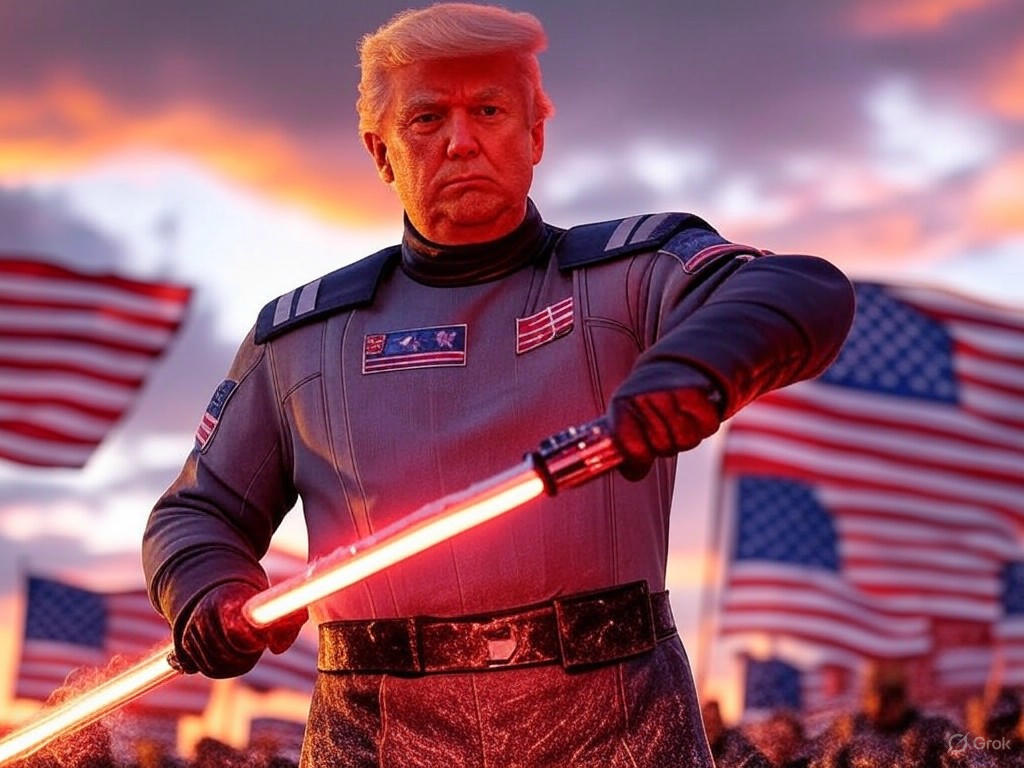
Trump Star Wars memes target immigrants critically
The Rise of the Trump Star Wars Meme in Political Debates
Picture this: a familiar pop culture icon twisted into a political storm. The Trump Star Wars meme, shared by the White House on May 4, 2025, during Star Wars Day, quickly became a flashpoint for heated discussions on immigration and online messaging. This AI-generated image showed a buffed-up President Donald Trump holding a red lightsaber, surrounded by symbols of American pride like flags and eagles, all while tying into sharp critiques of immigration policies. It’s a bold move that highlights how memes can pack a punch in modern politics, drawing millions of eyes in seconds.
But why does this matter? The post’s caption didn’t hold back, labeling opponents as “Radical Left Lunatics” aligned with “Sith Lords, Murderers, Drug Lords, and MS-13 Gang Members.” Ever wonder how a simple meme can escalate into a full-blown controversy? This one did, blending entertainment with pointed political jabs, making the Trump Star Wars meme a prime example of evolving White House strategies to engage—or enrage—the public.
As you scroll through social media, you might spot similar tactics everywhere. This approach isn’t just about fun; it’s a calculated effort to spotlight immigration enforcement, urging us to think twice about the narratives we consume online.
Unpacking the Red Lightsaber in Trump Star Wars Memes
At first glance, the red lightsaber in the Trump Star Wars meme seems like a clever nod to the dark side, but Star Wars fans weren’t buying it. In the franchise’s lore, red lightsabers are wielded by Sith villains, not heroes, which created an ironic twist in the White House’s portrayal of Trump. Critics pounced, pointing out the hypocrisy: how can you accuse others of being the “Empire” while equipping your leader with a weapon straight from the dark side?
One user quipped online, “At least they got one thing right—only the bad guys use red lightsabers.” It’s moments like these that make the Trump Star Wars meme so dissectible, turning a lighthearted holiday into a debate on self-awareness and political irony. If you’re a fan of the series, this oversight might feel like a facepalm moment, underscoring how cultural references can backfire when misunderstood.
This blunder isn’t isolated; it reflects broader trends in meme culture where details matter. By examining the Trump Star Wars meme closely, we see how even small elements can amplify criticisms of immigration rhetoric, reminding us that effective communication requires knowing your audience.
Patterns of Controversy in Trump Star Wars and Beyond
The Trump Star Wars meme didn’t emerge in a vacuum—it’s part of a pattern of provocative AI-generated content from the White House. Just a day earlier, another post depicted Trump as the Pope, which drew backlash during the mourning period after Pope Francis’s passing on April 21, 2025. Figures like former Italian Prime Minister Matteo Renzi and New York Catholic bishops voiced their disapproval, calling it tasteless and disrespectful.
Vice President JD Vance tried to brush it off, saying he was okay with jokes, but many found it crossed a line. Have you ever shared something online that got more criticism than laughs? That’s what happened here, showing how the Trump Star Wars meme fits into a larger strategy of pushing boundaries. These incidents highlight the risks of using AI tools for political imagery, especially when targeting sensitive topics like immigration.
In a world where memes spread like wildfire, this approach can energize supporters but alienate others. If you’re crafting your own content, remember: context is key to avoiding unintended fallout.
How White House Tactics Evolve with Trump Star Wars Memes
Over the past few years, the White House has shifted from formal press releases to meme-heavy campaigns, and the Trump Star Wars meme is a standout example. This change blends viral formats with policy discussions, like adapting the ‘100 men versus one gorilla’ meme to showcase immigration enforcement successes. According to Immigration and Customs Enforcement data, the administration deported over 65,000 individuals in Trump’s first 100 days, a statistic they amplified through these creative posts.
It’s fascinating how this evolution makes complex issues more relatable—think of it as turning policy into shareable stories. The Trump Star Wars meme, for instance, uses cultural hooks to criticize immigration stances, potentially reaching people who skip traditional news. But is this the right way to communicate? It sparks questions about balance: how do we keep discourse informative without fueling division?
For anyone in digital marketing or politics, this offers a lesson: engaging visuals can boost reach, but they must align with your message to avoid misfires.
Immigration Critiques Amplified by Trump Star Wars Memes
At its core, the Trump Star Wars meme zeroes in on immigration as a key battleground. The caption’s references to “Murderers, Drug Lords, and MS-13” echo longstanding administration rhetoric framing immigrants as threats to public safety. This isn’t new; it’s tied to real events, like the case of Kilmar Abrego Garcia, where the White House used memes to mock his deportation and link him to gang activity, defying Supreme Court rulings in the process.
These tactics aim to rally support for stricter enforcement, but they raise ethical questions about representation and fairness. If you’ve followed immigration debates, you know emotions run high—does a Trump Star Wars meme clarify or complicate the conversation? By weaving in pop culture, it makes the message stickier, yet it risks oversimplifying nuanced issues.
As a reader, consider how such content shapes your views. For policymakers, this is a reminder to pair strong visuals with accurate facts for more constructive dialogue.
The Strategy Behind Weaponizing Trump Star Wars Memes
Social media has become a battlefield, and the Trump Star Wars meme exemplifies how governments “weaponize” platforms to influence opinions. Researchers describe this as using emotional, divisive content to dominate news cycles, often through what they call “extreme speech.” It’s not outright hate, but it’s designed to stir reactions and spread quickly.
Think about it: by tying into Star Wars Day, the meme tapped into a global event, potentially exposing its message to millions who might ignore a standard policy update. This method, linked to studies on digital influence, shows how provocative posts can outpace traditional communication in reach and impact. If you’re navigating online spaces, ask yourself: how do I spot when content is meant to provoke rather than inform?
In essence, the Trump Star Wars meme demonstrates the power of cultural integration in political strategy, though it challenges us to maintain critical thinking amid the noise.
SEO Boosts from Controversial Trump Star Wars Memes
From an SEO standpoint, the Trump Star Wars meme thrives on controversy. High engagement—likes, shares, and heated comments—propels it up search rankings, creating a loop where media coverage further amplifies it. News outlets like the BBC use internal linking and keyword strategies to ride this wave, ensuring their stories gain traction in algorithms.
This dynamic rewards content that sparks debate, even if it’s divisive. For creators, it’s a double-edged sword: the Trump Star Wars meme shows how to leverage trends for visibility, but it also underscores the need for ethical practices. Want to optimize your own posts? Focus on natural keyword integration and genuine engagement to build a sustainable audience.
In a digital landscape dominated by algorithms, understanding these tools can help you craft messages that resonate without crossing lines.
Influences and Future of Trump Star Wars-Style Communication
Tracing “Russification” in Trump Star Wars Memes
Some experts compare the edgy style of the Trump Star Wars meme to tactics from foreign influence campaigns, often called “Russification.” This involves emotional provocation over facts, aiming to widen divides rather than bridge them. While no direct links exist, the parallels are striking, as seen in academic works like those from the University of Amsterdam’s research on social media manipulation.
It’s a shift that prioritizes viral potential over depth, raising concerns about democratic discourse. As we look ahead, how will this evolve? The Trump Star Wars meme might be just the start of more blended communication styles.
Implications for the Road Ahead
Looking forward, the Trump Star Wars meme signals a lasting change in how governments connect with the public. This blending of memes and policy could enhance engagement but also erode trust if not handled carefully. In an era of information overload, staying informed means questioning sources and seeking balanced views.
Ultimately, it’s up to us to navigate this landscape wisely. What do you think—could these tactics strengthen democracy or strain it further?
In wrapping up, if you’re passionate about politics or social media, consider exploring how to create content that informs and unites. Share your thoughts in the comments below, and check out our related posts on digital communication strategies for more insights.
References
1. Hindustan Times. “Sith Lords: White House shares Donald Trump’s photo for Star Wars Day, ends up in a goofup.” Link
2. Mediaite. “White House X Account Posts Bonkers Star Wars Meme Showing a Jacked Light-Saber-Wielding Trump Fighting Sith Lords.” Link
3. Axios. “Trump White House Star Wars Post.” Link
4. The Independent. “Star Wars Day: Donald Trump lightsaber post sparks backlash.” Link
5. YouTube Video. “Relevant discussion on immigration enforcement.” Link
6. Rogers and Niederer. “Research on social media and extreme speech.” University of Amsterdam. Link
7. Little’s Thesis. “Algorithmic amplification in political communication.” University of Glasgow. Link
8. White Rose eTheses. “Further studies on digital influence.” Link
Trump Star Wars meme, White House immigration policy, May the 4th controversy, AI-generated Trump images, red lightsaber controversy, social media tactics, immigration rhetoric, political memes, Star Wars Day debate, digital communication strategies







